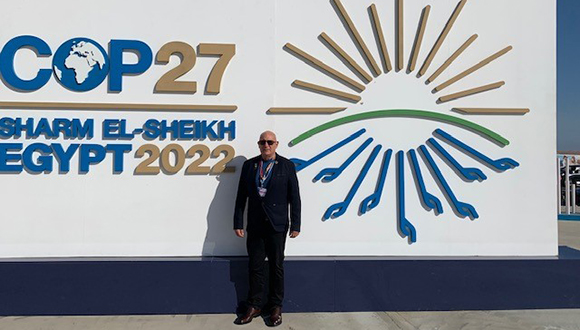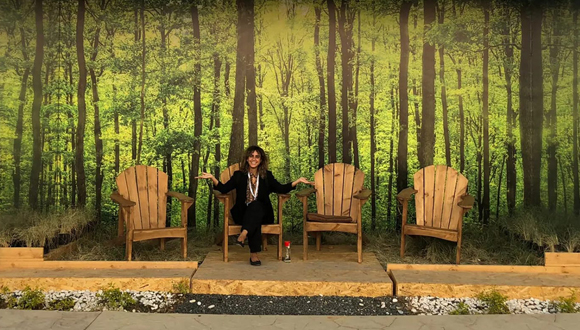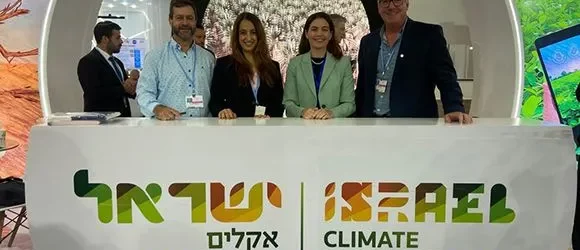Our researchers went to Egypt for the 2022 United Nations Climate Change Conference and returned with new insights.
The annual international climate conference held on November 6-20 was attended by world leaders, climate researchers and key officials from all over the world. On the agenda for this year’s summit was the implementation of decisions made at last year’s event, including the design of a global emissions trading program and provision of “loss and damage” funding to vulnerable countries hit hard by the climate crisis. Tel Aviv University researchers participated in several events held at the Israel Pavilion. They presented their groundbreaking research in various fields, aiming to provide practical solutions to the crisis facing our world.
We asked them to share their contributions and takeaways from the event.
“The enthusiasm for outer space is so great that we forget that by launching many satellites, up to hundreds every year, we pollute space and the effect can be fatal in the future.” Prof. Eyal Ben-Dor
Monitoring Climate Change from Space
Prof. Eyal Ben-Dor from the Department of Geography at the Porter School of the Environment and Earth Sciences is a world leading expert in hyperspectral (remote) sensing, a method of imaging the earth’s surface. He participated in a session on how space technologies can contribute to climate action. In the session, organized by the Israel Space Agency and Ministry of Foreign Affairs, Ben-Dor demonstrated innovative applications such as a quantitative monitoring of methane emissions; quantitative assessment of soil erosions following extreme rainfall; and the assessment of vegetation and risk of forest fires given extreme temperature increase.
Ben-Dor gives more details: “Dust constitutes a major problem in several respects: air pollution and breathing problems; migration of dust and with it, bacteria; its lowering of the intensity of radiation; its effect on plants (reducing their photosynthesis), and more. In addition, weather changes impact the risk of forest fires, so it is necessary to monitor this potential to prepare for fires long before they occur. We participate in projects run by foreign space agencies such as NASA [America’s civil space program] and ESA [European Space Agency], in order to monitor atmospheric dust from soil undergoing climatic decay, as well as changes in the organic carbon content in the world’s soils, which is an important component of the global balance of atmospheric carbon.”
His conclusions from the summit? That space can be used to monitor climate change and the phenomena that occur as a result, but with limited liability.
“The enthusiasm for outer space is so great that we forget that by launching many satellites, up to hundreds every year, we pollute space and the effect can be fatal in the future,” he warns. “Space gets filled up with human waste, and humanity must take into account not only the pollution of the earth’s surface, but also of space. Therefore, there should be regulation for planned launches, a sort of ‘launch treaty’ agreed upon by all countries, and priority should be given to launching satellites with a large capacity instead of a large number of satellites with little (but complementary) capacity.”
Ben-Dor returned from the conference with mixed feelings. “The event,” he says, “was good for ‘letting off steam’ between scientists and getting an idea of what is being done in tangential or other environmental fields. New collaborations were created, but it happened at the individual level and not in an organized way. The event was, in my opinion, one big political show of heads of state.”

Monitoring the Earth’s climate from space. Prof. Eyal Ben-Dor
“I was very hopeful that together we will be able to reach a solution and stop global warming. Some will say that this is a naive position, but if we don’t believe there’s a chance to succeed, then what’s the point of participating?” Meital Peleg Mizrahi
“Shocking and Unsettling”
Meital Peleg Mizrahi, is a PhD candidate from TAU’s Department of Public Policy at the Gershon H. Gordon Faculty of Social Sciences and a researcher of consumerism, sustainable fashion and environmental justice. She also presented at the conference, discussing a path to promote green employment and a just transition to a low-carbon economy.
“To be honest, participating at the climate conference was shocking and unsettling,” shares Peleg Mizrahi. “I arrived skeptical, but at the same time I was very hopeful that together we will be able to reach a solution and stop global warming. Some will say that this is a naive position, but if we don’t believe there’s a chance to succeed, then what’s the point of participating?”
According to her, the conference played out more like a business-academic conference than humanity’s greatest effort to fight the climate crisis. As a result, hardly any concrete achievements were made. “This is a very depressing situation, which puts a lot of personal responsibility on us, as researchers and as members of the public.”
“My main conclusion from Sharm El-Sheikh is that the solution won’t come from the governments of the world. The responsibility lies with us.”

Taking responsibility and promoting sustainable consumerism. Meital Peleg Mizrahi
“If we all act responsibly, we can change this world for the better.” Prof. Hadas Mamane
“We Can Change This World for the Better”
Prof. Hadas Mamane, Head of the Environmental Engineering Program at the Iby and Aladar Fleischman Faculty of Engineering, presented on the SoLED project, which aims to make safe drinking water available all over the world. The project offers a groundbreaking off-grid water disinfection device, designed for infrastructure-limited areas such as developing countries and deserts. It is designed to provide maximum disinfection at a low cost, and minimal human intervention is required for installment and operations purposes.
“At the conference, I had the opportunity to meet very interesting people, and listen to discussions that are not standard in terms of professional conferences,” says Mamane. “These included discussions on the climate crisis and women; how students can share their research through media; and the effects of the climate on environmental conflicts between Israel and the Palestinian Authority and between Israel and Jordan.”
“Although I have criticisms – a lot has already been said about ‘greenwashing’ [a critical term that describes the creation of an environmentally conscious public image to supposedly conceal harmful actions] in the context of Coca Cola as supporting sponsor to COP27 – I remain optimistic and think that if we all act responsibly, we can change this world for the better.”
Featured image: Israel’s pavilion at the COP27 conference. From left: Prof. Marcelo Sternberg; Prof. Hadas Mamane; Israel’s Minister of Environmental Protection Tamar Zandberg and Prof. Colin Price
